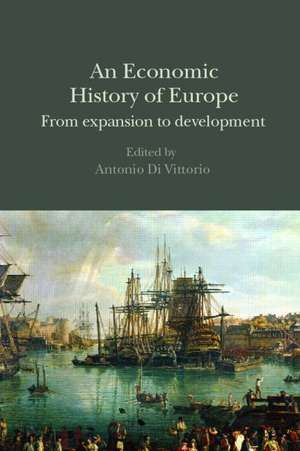An Economic History of Europe
Editat de Antonio Di Vittorioen Limba Engleză Paperback – 24 aug 2006
Core themes examined in each period include:
- the increasing prominence of industry
- international trade
- demand and supply dynamics
- agriculture.
This key text is indispensable reading for students in economics, economic history, development economics and history.
| Toate formatele și edițiile | Preț | Express |
|---|---|---|
| Paperback (1) | 465.94 lei 6-8 săpt. | |
| Taylor & Francis – 24 aug 2006 | 465.94 lei 6-8 săpt. | |
| Hardback (1) | 1019.63 lei 6-8 săpt. | |
| Taylor & Francis – 24 aug 2006 | 1019.63 lei 6-8 săpt. |
Preț: 465.94 lei
Preț vechi: 548.16 lei
-15% Nou
Puncte Express: 699
Preț estimativ în valută:
89.16€ • 93.28$ • 74.06£
89.16€ • 93.28$ • 74.06£
Carte tipărită la comandă
Livrare economică 02-16 aprilie
Preluare comenzi: 021 569.72.76
Specificații
ISBN-13: 9780415356251
ISBN-10: 0415356253
Pagini: 392
Ilustrații: 23 b/w images, 84 tables and 23 line drawings
Dimensiuni: 156 x 234 x 22 mm
Greutate: 0.59 kg
Ediția:1
Editura: Taylor & Francis
Colecția Routledge
Locul publicării:Oxford, United Kingdom
ISBN-10: 0415356253
Pagini: 392
Ilustrații: 23 b/w images, 84 tables and 23 line drawings
Dimensiuni: 156 x 234 x 22 mm
Greutate: 0.59 kg
Ediția:1
Editura: Taylor & Francis
Colecția Routledge
Locul publicării:Oxford, United Kingdom
Cuprins
Introduction Part 1: The Economy in the Fifteenth Century: Preconditions for European Expansion 1. An Integrated Economic System: Europe in the Fifteenth Century 2. Supply and Demand of Goods: Agricultural and Manufactured Goods 3. Work Organization and Techniques 4. The Expansion of Geographical and Economic Dimensions Part 2: European Expansion in the Sixteenth Century 1. Population 2. Agriculture 3. Anticipating the New Science 4. International Exchanges 5. Finance 6. Different Roles in Europe Part 3: European Expansion in the Seventeenth Century I. General Trends 1. Demography: Crisis and Slow Recovery 2. Agriculture and Land Ownership 3. Cities, Manufactures, Commerce and Finance II. New Powers: Mercantilism and the Formation of the Modern State 1. Holland 2. France 3. England: An Overall View Part 4: The European Economies in the Eighteenth Century 1. New Perspectives on Economic Modernization and Europe's Many Paths to the Twentieth Century 2. European Economic Development in the Eighteenth Century: The Central Themes 3. Agrarian Europe 1700–1800 4. The Enigma of the Eighteenth Century: The Demographic Revolution 5. The Growth of Trade 6. Industries and Manufactures 7. The Role of the State 8. The Napoleonic Era Part 5: The Economic Development of Europe in the Nineteenth Century 1. Growth and Transformation of the European Economy 2. Demographic Dynamics and Social Change: The Role of Agriculture 3. The Process of European Industrialization 4. The Revolution in Transport and Communications 5. International Exchanges and Monetary Systems Part 6: The Twentieth Century, from Break with the Past to Prosperity. The Starting Point 1. Growth and Transformation of the Economy 2. The Great Stages 3. Economic and Social Policies
Notă biografică
Antonio Di Vittorio is Professor of Economic History at the University of Bari in Italy and President of the Italian Association of Economics Historians.
Descriere
This unique book devotes equal time to the period leading up to the industrial age as to that which followed; a comprehensive sweep which will ensure it becomes the definitive textbook of European economic history for years to come.
